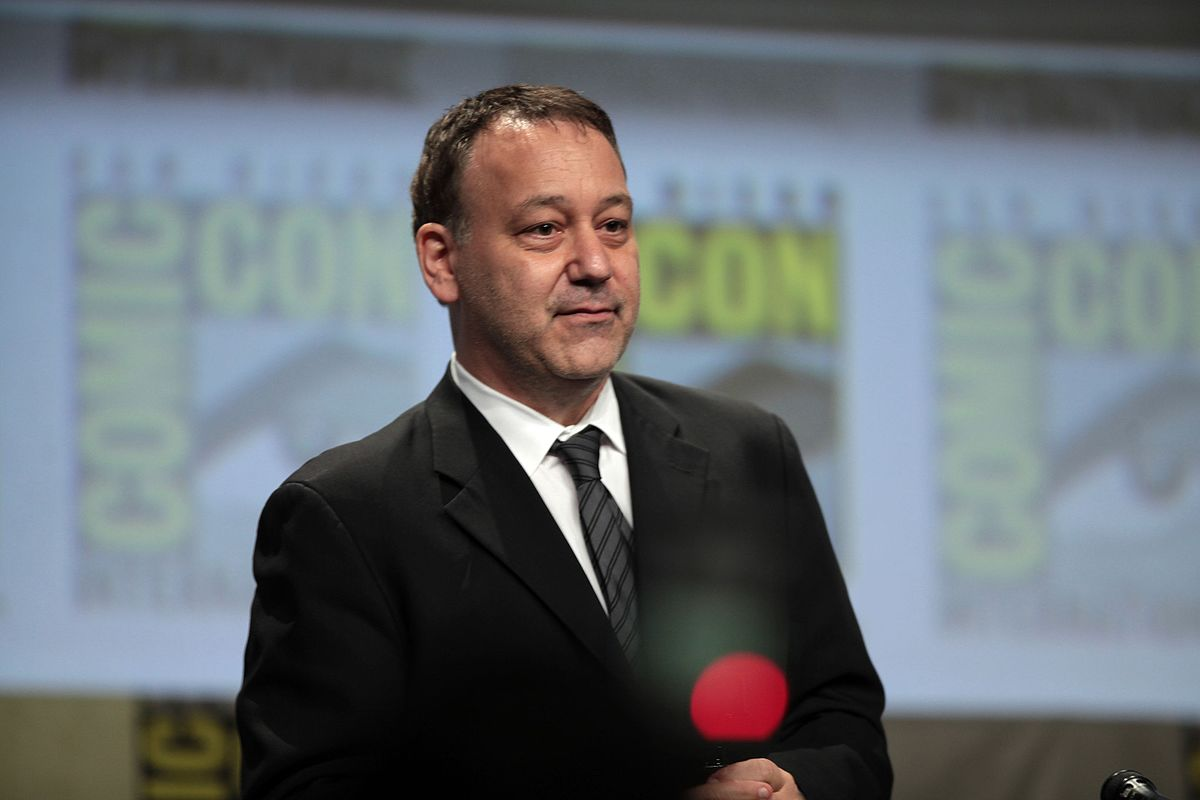Title of the work
Studio / Production Company
Country of the First Edition
Country/countries of popularity
Original Language
First Edition Date
First Edition Details
Hercules and the Lost Kingdom. Directed by Harley Cokeliss; written by Christian Williams. USA, (Universal) Action Pack Weds 8-10pm (syndicated television); 2 May 1994. 91 mins.
Running time
Format
Date of the First DVD or VHS
Genre
Action and adventure fiction
B films
Mythological fiction
Television series
Target Audience
Crossover
Cover

We are still trying to obtain permission for posting the original cover.
Author of the Entry:
Joel Gordon, University of Otago, joel_gordon@hotmail.co.nz
Peer-reviewer of the Entry:
Elizabeth Hale, University of New England, ehale@une.edu.au
Elzbieta Olechowska, University of Warsaw, elzbieta.olechowska@gmail.com

Sam Raimi by Gage Skidmore. Retrieved from Wikimedia Commons, licensed under CCBY-SA 2.0 (accessed: December 30, 2021).
Sam Raimi
, b. 1959
(Producer)
Sam Raimi is an American filmmaker, actor and producer. He was born in Michigan (USA), to a conservative Jewish family, and attended Michigan State University. His career has been closely linked with that of Robert Tapert. Although Raimi intended to major in English, he chose to put his studies on hold in order to work on the feature film The Evil Dead (1981), after the success of his first co-operative production with Robert Tapert, The Happy Valley Kid (1977). Raimi is a co-founder of both Renaissance Pictures and Ghost House Pictures (see above). His solo-directorial work (distinct from productions with Tapert) include the original Spider-man trilogy (2002–2007) starring Tobey Macquire, and, most recently, Oz the Great and Powerful (2013). His most recent solo-producer role was for the crime-thriller, Don’t Breathe (2016). As an actor, Raimi has appeared in many of his own films as minor characters – such as his cameo appearances in The Evil Dead and its sequels. Raimi turned to television during the 1990’s, working together with Tapert as a producer for the franchises Hercules: The Legendary Journeys, Xena: Warrior Princess, Young Hercules and Spartacus.
Bio prepared by Joel Gordon, University of Otago, joel_gordon@hotmail.co.nz

Robert Tapert by Cooltv. Retrieved from Wikipedia, licensed under CC0 (accessed: December 30, 2021).
Robert Tapert
, b. 1955
(Author, Producer)
Robert Tapert is an American actor, producer and writer. Born in Royal Oak, Michigan (USA), he attended Michigan State University where he first began experimenting with filmmaking under the influence of Sam Raimi. During this time, they both worked on the film The Happy Valley Kid (1977) in which Tapert also starred in the leading role. Following the success of this venture, the pair began work on their first feature film, The Evil Dead (1981) – directed by Sam Raimi and starring Bruce Campbell – and, in order to assist with its production, Tapert, Raimi and Campbell (along with Irvin Shapiro) co-founded Renaissance Pictures in 1979. This trio have since worked together on numerous successful films – particularly in the horror genre – including: Crimewave (1985), Easy Wheels (1989), Darkman (1990), Lunatics: A Love Story (1991), Timecop (1994), 30 Days of Night (2007) and The Gift (2015). In 2002 Tapert and Raimi co-founded Ghost House Pictures known for, among others, the film franchises The Grudge (2004, 2006, 2009) and Bogeyman (2005, 2007, 2008). Tapert’s involvement in television began during the 1990’s with his most notable productions being the franchises of Hercules: The Legendary Journeys (1995-1999), Xena: Warrior Princess (1995–2001) and Young Hercules (1998–1999) – all of which included both direct-to-television movies and television serials spanning several seasons. It was during this period – in 1998 – that Tapert married New Zealand actress Lucy Lawless (the star of Xena), with whom he has since had two children. More recently, his interest in antiquity and television has returned with the serials Spartacus: Blood and Sand (2010), Spartacus: Gods of the Arena (2011), Spartacus: Vengeance (2012) and Spartacus: War of the Damned (2013) and plans for a Xena reboot for NBC. (see further, his official website, accessed: August 16, 2019).
Bio prepared by Joel Gordon, University of Otago, joel_gordon@hotmail.co.nz

Christian Williams by Pacunagonz. Retrieved from Wikimedia Commons, licensed under CC BY-SA 4.0 (accessed: December 30, 2021).
Christian Williams
, b. 1943
(Author, Producer)
Christian Williams is an American journalist and television writer from Brooklyn, New York. His career in the news industry began in 1972 as an assistant editor (Style Section) for The Washington Post. It was during his early years at the Post that Williams was given a unique insight into the film/television industry, serving as the editor on a behind-the-scenes exclusive when Robert Redford used the Post’s newsroom to research his film All the President’s Men (1976). In 1984 Williams became a reporter in Bob Woodward’s investigative team which led to his second interaction with the film/television industry: in 1986 Woodward’s team (Woodward, Williams and co-journalist Richard Harwood) wrote and featured in an ABC movie, Under Siege, which was based upon the group’s reporting on domestic terrorism. Williams then continued to dabble in the television industry, co-writing (alongside Woodward) an episode of the television drama series Hill Street Blues (1981–1987), before formally leaving journalism for a career as a television writer – specializing in one-hour drama television shows. He went on to co-create (alongside David Milch) the drama Capital News (1990) before assisting in the creation of Hercules: The Legendary Journeys franchise (which began with the five direct-to-television films). Unlike Tapert and Raimi, however, Williams was not directly involved in the production of the Hercules: The Legendary Journeys serial beyond the pilot films. Williams went on to continue writing for television, for example as the co-executive producer of the drama Six Feet Under (2001–2005), until he retired in 2010. He has since turned his interests to authoring books and sailing.
Bio prepared by Joel Gordon, University of Otago, joel_gordon@hotmail.co.nz
Casting
Hercules: Kevin Sorbo,
Zeus: Anthony Quinn,
Deianeira (Princess of Troy, not Hercules’ wife): Renée O'Connor,
Queen Omphale: Elizabeth Hawthorne.
Adaptations
See season 0 entry.
Sequels, Prequels and Spin-offs
See season 0 entry.
Summary
This film’s narrative finds little direct precedent within ancient mythology but draws upon several identifiable themes/tropes for inspiration. After successfully saving a village from a giant, Hercules is approached by a messenger who asks for the hero’s help: his people have been forced out of their home-town, the “lost kingdom” of Troy. Zeus reveals that Hera caused the disappearance of Troy and, in order to find it, Hercules requires the “true compass”.
Setting off to find the compass, Hercules encounters a beautiful woman who is about to be sacrificed. Upon being rescued, the woman reveals that her name is Deianeira and she is the daughter of a King. She accompanies Hercules to the court of Queen Omphale of Lydia, the previous owner of the true compass, to whom Hercules sells himself as a slave in order to procure the compass. Then, upon arriving at the ocean, Hercules and Deianeira are attacked by a sea serpent which, under the influence of Hera, swallows the pair. Hercules slays the monster from the inside and the duo wash up on the shore of Troy – Deianira recognises the city and informs Hercules that this is where she is from. Deianira and Hercules as led before the King of Troy who, although grievously ill, is glad to be reunited with his daughter. He informs her that the Cult of the Blue Priests have successfully performed a coup and now control the city. He encourages his daughter to rule well before passing away.
Hercules trains the townspeople in combat, hoping to retake Troy from the Cult but Deianeira goes off in search of the Blue Priest (the cult’s leader) whom she knows must be defeated first. Only once the battle between the townspeople and the Cult is in full swing does Hercules notice Deianeira’s absence, setting off at once to find her. Meanwhile the Blue Priest has captured Deianeira and is about to sacrifice her to Hera. Upon the Priest’s defeat by Hercules, a large storm begins to brew. Zeus appears and informs Hercules that this is Hera coming for Deianeira. Hercules saves the (now) Queen of Troy and is himself taken by the storm in her place. The storm deposits Hercules in an unidentified land but it is not long before a man approaches him to ask for his help – beginning the hero’s next quest.
Analysis
As indicated above, this film’s narrative finds no direct precedent in antiquity; however, it draws upon some ancient tropes and modifies these in response to the film’s chosen presentation of Hercules as a modern hero (see season 0 overview).
First, the overarching theme of the series – i.e. Hera’s animosity towards Hercules as the reason for the hero’s quests – is an ancient theme which can be seen, for example, in Euripides’ play Heracles (in which Hera is responsible for driving Hercules mad, causing him to inadvertently slay his wife and children). More subtle, however, is the connection of Hercules and the city of Troy. According to Homer’s Iliad and the mythographer Apollodorus, Hercules once visited Troy and sacked the city (prior to the events of the renowned Trojan War). This sacking was an act of retaliation by Hercules against the Trojan king Laomedon who reneged on his promise to pay Hercules with Zeus’ horses should the hero prevent a sea monster (sent by Poseidon) from destroying the city. As can be seen in the summary of this film, several of these elements have made it into this modern narrative – the sea serpent and Hercules’ visit to Troy; however, they have had to be adapted to fit the overarching narrative of the series (i.e. Hera’s animosity) and Hercules’ characterisation (i.e. this modern Hercules would not sack a city for lack of payment). It should also be noted that Deianeira, princess of Troy, is not a known figure from mythology and has been created purely for this film. The ancients knew of a Deianeira who was Hercules’ wife, but this film’s Deianeira should not be confused with this figure, since Hercules’ wife by this name is introduced in the next film in the series, Hercules and the Circle of Fire, and is played by Tawny Kitaen rather than Renée O'Connor. This ‘confusion’ demonstrates the way in which the series is happy to adapt certain ancient tropes/themes in light of their overarching narrative concerns or characterisation of Hercules, and is less interested in providing a holistic, internally consistent portrayal of the ancient myths. But, given that the ancients themselves did not hold to a notion of canonicity, this itself reflects the reception of myth within the ancient world.
Further Reading
See season 0 entry.
Addenda
Director: Josh Becker.
Writers: Andrew Dettmann and Daniel Truly.


